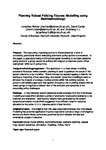Planning robust policing futures: modelling using multimethodology
| dc.contributor.author | Moizer, Jonathan | |
| dc.contributor.author | Carter, D | |
| dc.contributor.author | Liu, Shaofeng | |
| dc.date.accessioned | 2015-06-26T12:19:23Z | |
| dc.date.available | 2015-06-26T12:19:23Z | |
| dc.date.issued | 2015-04-13 | |
| dc.identifier.issn | 0263-5577 | |
| dc.identifier.issn | 1758-5783 | |
| dc.identifier.uri | http://hdl.handle.net/10026.1/3385 | |
| dc.description.abstract |
Purpose – The resourcing of policing activity is characterised by a level of complexity, particularly where evaluating alternative policy options is concerned. In this paper, a case study using multimethodological modelling to compare alternative policy choice in a group context is outlined with respect to response-patrol officer (RPO) deployment within a UK police force. The paper aims to discuss these issues. Design/methodology/approach – The application of a three phase modelling process is illustrated where scenario planning is used to generate the scope of the system elements to be modelled. This is followed by causal mapping to identify the barriers to improving officer resourcing, and system dynamics modelling is used to simulate the impacts of a range of policy options within this policing function. A group model building approach was applied throughout the modelling phases with anexpert group to negotiate a shared view of the structure and dynamics of the resourcing policy challenges. Findings – A fully validated system dynamics model emerged from the multi-phase modelling process which allowed a series of alternative future policy scenarios to be explored and evaluated. Useful policy insights were generated by the system dynamics simulation model which suggested more efficient rules for resource allocation in the police force’s RPO function. Originality/value – The insights from this case study demonstrates that multi-phase modelling has potential application in policy exploration across a range of emergency service providers whoseactions are governed by both variable demand and constrained supply of resource | |
| dc.format.extent | 462-482 | |
| dc.language | English | |
| dc.language.iso | English | |
| dc.publisher | Emerald | |
| dc.subject | System dynamics | |
| dc.subject | Police | |
| dc.subject | Scenario planning | |
| dc.subject | Causal map | |
| dc.subject | Group model building | |
| dc.subject | Multimethodology | |
| dc.title | Planning robust policing futures: modelling using multimethodology | |
| dc.type | journal-article | |
| dc.type | Article | |
| plymouth.author-url | https://www.webofscience.com/api/gateway?GWVersion=2&SrcApp=PARTNER_APP&SrcAuth=LinksAMR&KeyUT=WOS:000354647900004&DestLinkType=FullRecord&DestApp=ALL_WOS&UsrCustomerID=11bb513d99f797142bcfeffcc58ea008 | |
| plymouth.issue | 3 | |
| plymouth.volume | 115 | |
| plymouth.publisher-url | http://gateway.webofknowledge.com/gateway/Gateway.cgi?GWVersion=2&SrcApp=PARTNER_APP&SrcAuth=LinksAMR&KeyUT=WOS:000354647900004&DestLinkType=FullRecord&DestApp=ALL_WOS&UsrCustomerID=11bb513d99f797142bcfeffcc58ea008 | |
| plymouth.publication-status | Published | |
| plymouth.journal | Industrial Management and Data Systems | |
| dc.identifier.doi | 10.1108/IMDS-11-2014-0336 | |
| plymouth.organisational-group | /Plymouth | |
| plymouth.organisational-group | /Plymouth/Faculty of Arts, Humanities and Business | |
| plymouth.organisational-group | /Plymouth/Faculty of Arts, Humanities and Business/Plymouth Business School | |
| plymouth.organisational-group | /Plymouth/REF 2021 Researchers by UoA | |
| plymouth.organisational-group | /Plymouth/REF 2021 Researchers by UoA/UoA17 Business and Management Studies | |
| plymouth.organisational-group | /Plymouth/Users by role | |
| plymouth.organisational-group | /Plymouth/Users by role/Academics | |
| dc.publisher.place | United Kingdom | |
| dcterms.dateAccepted | 2015-01-25 | |
| dc.identifier.eissn | 1758-5783 | |
| dc.rights.embargoperiod | No embargo | |
| rioxxterms.versionofrecord | 10.1108/IMDS-11-2014-0336 | |
| rioxxterms.licenseref.uri | http://www.rioxx.net/licenses/all-rights-reserved | |
| rioxxterms.licenseref.startdate | 2015-04-13 | |
| rioxxterms.type | Journal Article/Review |


